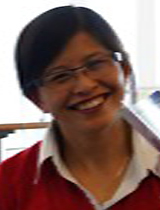A Personal Story of a Cultural Broker (MA UCEDD/LEND)
September 8, 2016

|
In this 3-part series, a mother of a child with special needs describes how she became a cultural broker to support other families.
Part 1
"You should stop speaking Vietnamese to your daughter," the school professional told me. "It will just confuse her." The professional went on to imply that I was taking things for granted and using tax dollars for my own child's benefit.
My daughter, who is nonverbal, had been at school in the US for about two months at that point. As a single mom who was unfamiliar with the educational, medical, and social support systems in the US, I was feeling frustrated while navigating the system of care and support for my child.
I still struggle with balancing my cultural values while searching for services for my child with special needs. I don't have a support network of extended family members here, as I would if I was still in Vietnam.
But when the school professional said those words, I realized I needed to step up and help my own daughter, as well as other Vietnamese parents whose children have disability.
I established a support group for Vietnamese-speaking parents of children with special needs, called the Vòng Tay Cha Mẹ Việt (Circle of Vietnamese Parents). Armed with my personal and professional cultural experiences, and my newly gained knowledge of the US disability service systems, I became a culture broker: a connector and negotiator between the Vietnamese immigrant community, and the system of social supports available to them here in Boston.
The need for cultural brokering
When I was new to the US and overwhelmed with the complicated needs of my daughter, I attended many workshops, trainings, and support groups for parents. It was wonderful to meet and learn from other parents of a child with special needs who experience my situation, understand what I have been through, and are willing to share with me.
However, due to my cultural beliefs, I work hard to teach myself everything I can, rather than relying on others. And because I held professionals in such high regard, I never challenged my daughter's educational team.
As my knowledge of US support systems grew, I realized that following what professionals told me, and teaching myself, were not enough. I wanted to provide a strong voice on behalf of other Vietnamese women, many of whom who lack understanding of their child's disability. These mothers may also have different perspectives and expectations for their children with special needs, and at the same time feel isolated due to social stigma from their community.
I searched in vain for a support group for Vietnamese-speaking parents like me, and clearly, none existed. I learned that, here in the U.S., if you do not speak the language and you don't assimilate into the mainstream, you will be forgotten. I realized, "You can continue on this path all alone, and nobody will help unless you break a basic cultural value and reach out for help."
That's when I started the Circle of Vietnamese Parents.
Community-driven support
I established this support group in 2012. Today, it has supported more than 120 families across the state.
A big component of our program is to provide emotional support to mothers and fathers whose children have a disability, including invisible disabilities like autism, which are not well recognized within the Vietnamese community.
We also arrange for speakers to educate parents about community systems and services; the importance of parental involvement in their children's education; parents' rights in special education; and different resources across the lifespan. Concepts such as independent living, self-determination, self-advocacy, employment for people with disability, guardianship, and special needs trusts are novel to the Vietnamese community.
Through word of mouth, more and more families have felt comfortable attending the support group and reached out to me for support. I spend time to understand each family's situation and family structure, their perceptions about their child's disability, and their knowledge about U.S. service delivery systems. I also learn about their English proficiency, their education level, and the family's availability and comfort with sharing their personal stories.
Learn more about Oanh's story in Part 2 of this series, coming up soon.







